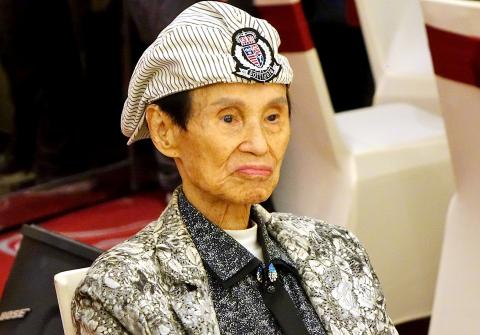Famed Taiwanese folk singer Wen Hsia’s (文夏) caregiver yesterday told police in Taipei that he did not feed the 91-year-old drugs, after traces of marijuana and nimetazepam showed up in hospital tests.
Taipei police said a report was filed by Wen’s family on Sept. 16 saying that he had been hospitalized for a sickness and could not be woken up.
His family suspected that someone had “poisoned” him and provided the hospital test results, police said.

Photo: Pan Shao-tang, Taipei Times
Wen was admitted to Mackay Memorial Hospital in Taipei on Sept. 12 for pneumonia, sources said, adding that his family hired a 35-year-old caregiver surnamed Chen (陳), but at 10am the following day, family members found that Wen could not be woken up.
Suspecting that something was amiss, his family reported the situation to the hospital and replaced the caregiver, the sources said.
Urine test results on Sept. 16 showed that Wen tested positive for marijuana and nimetazepam, better known by the brand name Erimin, the sources said.
The family immediately reported the case to the police and filed a lawsuit against Chen for allegedly causing bodily harm to Wen, the sources said.
Taipei police yesterday summoned Chen for questioning.
Chen told the police that he smokes cigarettes, but does not use drugs and did not feed drugs to Wen, the sources said.
Chen said he was in an out of Wen’s hospital room multiple times on the day he was caring for him, because he went outside to smoke, the sources said.
The singer’s wife, Wen Hsiang (文香) told a news conference yesterday that she and some family members and friends visited him at the hospital on Sept. 13 to help him celebrate the Mid-Autumn Festival.
However, they could not wake him up, she said, adding that Chen was also sleeping.
Wen Hsia did not wake up for about five days, so she asked the hospital to administer a urine test, she said.
After he woke up, she did not tell him that traces of marijuana and Erimin had been detected in his body, she said, adding that she was afraid he would be worried.
Wen Hsia, who was discharged from the hospital earlier this month, is not aware that he slept for five days, she said.
He is physically weak, but his mind is clear, Wen Hsiang said, adding that she would leave it to the police to investigate the incident.
Additional reporting by Yang Hsin-han

GAINING STEAM: The scheme initially failed to gather much attention, with only 188 cards issued in its first year, but gained popularity amid the COVID-19 pandemic Applications for the Employment Gold Card have increased in the past few years, with the card having been issued to a total of 13,191 people from 101 countries since its introduction in 2018, the National Development Council (NDC) said yesterday. Those who have received the card have included celebrities, such as former NBA star Dwight Howard and Australian-South Korean cheerleader Dahye Lee, the NDC said. The four-in-one Employment Gold Card combines a work permit, resident visa, Alien Resident Certificate (ARC) and re-entry permit. It was first introduced in February 2018 through the Act Governing Recruitment and Employment of Foreign Professionals (外國專業人才延攬及雇用法),

RESILIENCE: Deepening bilateral cooperation would extend the peace sustained over the 45 years since the Taiwan Relations Act, Greene said Taiwan-US relations are built on deep economic ties and shared values, American Institute in Taiwan (AIT) Director Raymond Greene said yesterday, adding that strengthening supply chain security in critical industries, enhancing societal resilience through cooperation and deepening partnerships are key to ensuring peace and stability for Taiwan in the years ahead. Greene made the remarks at the National Security Youth Forum, organized by National Taiwan University’s National Security and Strategy Studies Institution in Taipei. In his address in Mandarin Chinese, Greene said the Taiwan-US relationship is built on deep economic ties and shared interests, and grows stronger through the enduring friendship between

CAUTION URGED: Xiaohongshu and Douyin — the Chinese version of TikTok — are tools the Chinese government uses for its ‘united front’ propaganda, the MAC said Mainland Affairs Council (MAC) Minister Chiu Chui-cheng (邱垂正) yesterday urged people who use Chinese social media platforms to be cautious of being influenced by Beijing’s “united front” propaganda and undermining Taiwan’s sovereignty. Chiu made the remarks in response to queries about Chinese academic Zhang Weiwei (張維為) saying that as young Taiwanese are fond of interacting on Chinese app Xiaohongshu (小紅書, known as RedNote in English), “after unification with China, it would be easier to govern Taiwan than Hong Kong.” Zhang is professor of international relations at Shanghai’s Fudan University and director of its China Institute. When giving a speech at China’s Wuhan

ENHANCE DETERRENCE: Taiwan has to display ‘fierce resolve’ to defend itself for China to understand that the costs of war outweigh potential gains, Koo said Taiwan’s armed forces must reach a high level of combat readiness by 2027 to effectively deter a potential Chinese invasion, Minister of National Defense Wellington Koo (顧立雄) said in an interview with the Chinese-language Liberty Times (sister newspaper of the Taipei Times) published yesterday. His comments came three days after US Secretary of State Marco Rubio told the US Senate that deterring a Chinese attack on Taiwan requires making a conflict “cost more than what it’s worth.” Rubio made the remarks in response to a question about US policy on Taiwan’s defense from Republican Senator John Cornyn, who said that Chinese